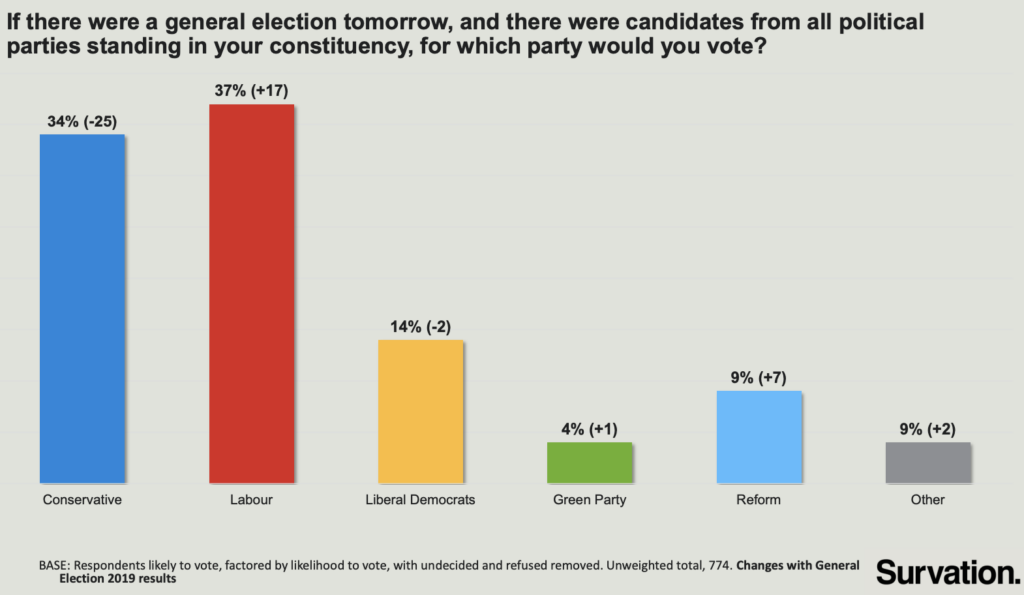Labour has overtaken the Conservatives in the countryside vote, according to dramatic new polling by the Country Land and Business Association (CLA) and Survation.
The poll of more than 1,000 people in England’s 100 most rural constituencies revealed a 25-point collapse, compared with the 2019 General Election, in support for the Conservatives to just 34%.
Meanwhile, the share of the Labour vote has almost doubled, climbing 17 points to 37%, putting Sir Keir Starmer’s party 3 points up on its main rivals in the rural heartlands, ahead of a General Election at some point this year.
The Conservatives, who trail Labour by a long way in the national polls, have also lost ground to the Reform Party, which has increased its share of the rural vote from 2% in 2019 to 9% in the latest survey, while the Liberal Democrats have lost a little ground to stand at 14%.
The survey also highlights how the Conservatives have lost support to Reform since the last CLA-Survation survey in April 2023, losing 7 points, while reform gained 5.
The latest survey showed more respondents believe Labour understands and respects rural communities and the rural way of life than the Conservatives (28% versus 25%).
The Conservatives currently hold 96 of the 100 most rural seats, but the findings reveal that the Conservatives may win just 43 of them at the election, with Labour taking 51. High profile casualties are projected to include Jeremy Hunt, Jacob Rees-Mogg, Thérèse Coffey, Andrea Leadsom, Mel Stride, Mark Harper and Liam Fox.
However, with England’s rural population standing at 10 million, the poll also revealed a large chunk of the electorate is still up for grabs, the CLA stressed. When asked which of the political parties is most trusted to stimulate economic growth, the largest group of respondents said ‘don’t know’ (35%).
CLA president Victoria Vyvyan said: “People living in the countryside are ambitious – they want to start businesses, create jobs and grow the economy but for decades, governments of all colours have treated the countryside as a museum, failing to generate the conditions necessary for growth.
“This poll makes it clear that rural voters up and down the country feel politically homeless and disconnected from central government – but their votes are still up for grabs. Whichever party produces a robust and ambitious plan for growth in the rural economy will undoubtedly secure support.
“For the good of our rural communities and the nation as a whole, now is the time for the main parties to make it clear that they will back the countryside.”
The poll comes as the CLA, which represents nearly 27,000 farmers, landowners and rural businesses across England and Wales, publishes a blueprint setting out how parties can help unlock the full potential of the rural economy.
The six documents, or missions, cover topics such as profitable and sustainable farming, affordable housing, rural crime and delivering economic growth in rural areas.
Among these ‘missions’ is a call from the CLA for an increased agricultural budget of at least £4 billion a year to invest in a world-class agriculture policy and help farmers deliver meaningful improvements to the environment.




